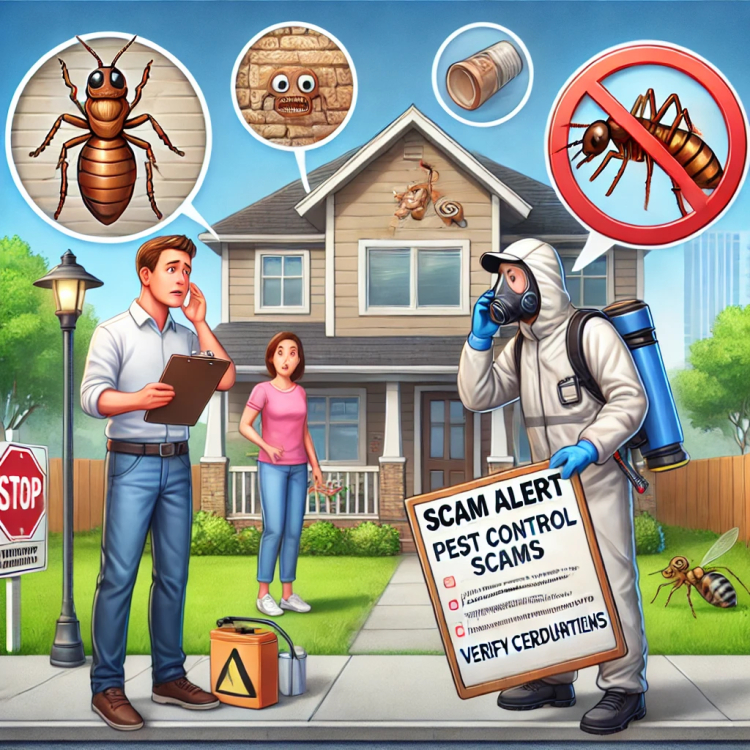Common Pest Control Scams and How to Avoid Them
Pest control services are essential for maintaining a clean and healthy living environment

Common Pest Control Scams and How to Avoid Them
Pest control services are essential for maintaining a clean and healthy living environment. Unfortunately, the industry has its share of bad actors who exploit unsuspecting customers. Being informed about common pest control scams can help you protect yourself and ensure you receive quality service. Here are some common scams and tips to avoid them.
1. "Free" Inspections Leading to Exaggerated Problems
One of the most common scams involves pest control companies offering free inspections. While legitimate companies also offer this service, fraudulent ones use it as an opportunity to fabricate or exaggerate pest problems. For instance, they might claim you have a severe termite infestation when there’s only minor damage or no issue at all.
How to Avoid:
-
Always get a second opinion before committing to expensive treatments.
-
Research the company’s reputation through online reviews and Better Business Bureau (BBB) ratings.
-
Request evidence, such as photos or videos, of the supposed infestation.
2. Pressure Tactics to Sign Contracts
Scammers often use high-pressure tactics to push you into signing a long-term contract or agreeing to immediate treatments. They might claim the infestation is an emergency that requires immediate action, leaving you little time to research or compare options.
How to Avoid:
-
Take your time to read the contract thoroughly.
-
Avoid signing anything on the spot; instead, request a copy to review at your leisure.
-
Consult other pest control providers for comparisons.
3. Unnecessary or Excessive Treatments
Some companies recommend unnecessary treatments or excessive follow-up visits that inflate costs without providing added value. For example, they may suggest monthly termite treatments when annual treatments are sufficient.
How to Avoid:
-
Educate yourself about the pest problem and standard treatment protocols.
-
Ask for a clear explanation of why specific treatments are needed and whether alternatives exist.
-
Get itemized quotes from multiple providers.
4. Fake Credentials and Licensing
Dishonest pest control operators may claim to be licensed, certified, or affiliated with professional organizations when they are not. This scam can result in substandard work and potential health risks.
How to Avoid:
-
Verify the company’s licensing with your local regulatory authority.
-
Request proof of certification or membership in industry organizations.
-
Avoid companies that cannot provide proper documentation.
5. "Lifetime Guarantees" with Hidden Costs
Some pest control companies offer lifetime guarantees that seem too good to be true. Upon closer inspection, these guarantees often come with hidden fees, annual inspection charges, or other conditions that make them less appealing.
How to Avoid:
-
Read the fine print of any guarantee or warranty.
-
Ask for clarification on additional costs or renewal fees.
-
Be cautious of guarantees that sound overly generous.
6. Unmarked Vehicles and No Documentation
Legitimate pest control companies usually have branded vehicles and provide detailed documentation for their services. Scammers, on the other hand, may show up in unmarked vehicles and fail to provide receipts or contracts.
How to Avoid:
-
Insist on proper documentation, including a written estimate and invoice.
-
Be wary of companies that cannot provide a physical address or business license.
-
Look for branded uniforms and vehicles as signs of a professional operation.
7. Door-to-Door Sales Scams
Some scammers operate by going door-to-door, claiming to offer discounted pest control services in your area. They might pressure you to make an immediate payment or provide a deposit, only to disappear without completing the work.
How to Avoid:
-
Avoid making immediate payments to door-to-door salespeople.
-
Verify their identity and business credentials before agreeing to any service.
-
Check online reviews and confirm the company’s legitimacy.
General Tips for Choosing a Pest Control Service
-
Research the Company: Look for online reviews, testimonials, and ratings on platforms like Google, Yelp, and BBB.
-
Ask for Referrals: Seek recommendations from friends, family, or neighbors who have had positive experiences with pest control services.
-
Get Multiple Quotes: Compare pricing and services from at least three companies to ensure you’re getting fair value.
-
Verify Insurance: Ensure the company has liability insurance to cover any damage to your property or accidental exposure to harmful chemicals.
-
Read Contracts Carefully: Understand the terms of service, including cancellation policies, warranties, and guarantees, before signing.
By staying vigilant and informed, you can avoid falling victim to pest control scams and ensure your home remains pest-free with professional and reliable service.













